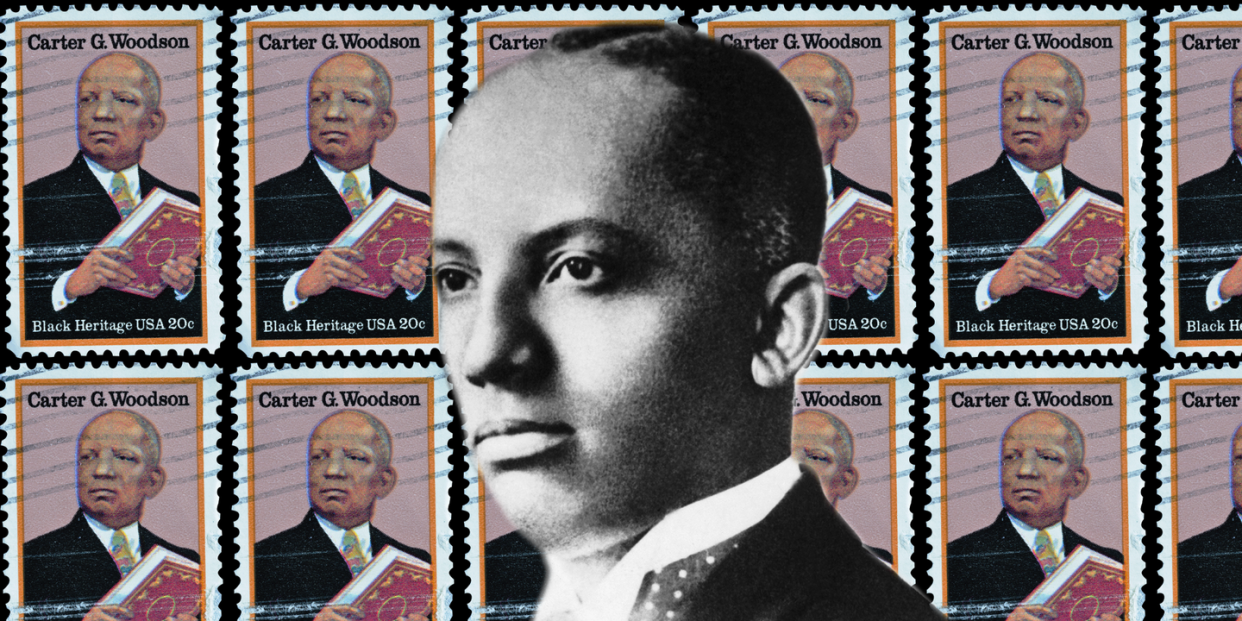Just So You Know: Here’s Why Black History Month Is in February

It’s February, which means it’s officially Black History Month! While many rightfully give side-eye to the fact that there are only 28 (or sometimes 29) days to celebrate the achievements of Black people (versus a full 30 or 31 or, ya know, 365)—which, yeah! It’s not enough!—there’s more behind the reason Black History Month falls in February. Let me explain.
Carter G. Woodson originated the concept of celebrating Black accomplishments.
For starters, Black History Month wouldn’t exist in the way that it does now without the work of Carter G. Woodson, PhD. The Harvard grad, activist, and Black history scholar attended the 50th anniversary celebration of the emancipation of slaves in 1912, held in Illinois, writes Daryl Scott, PhD, professor of history at Howard University. More than 6,000 people showed up to view exhibits about the things Black people had achieved since the Emancipation Proclamation. Those crowds and the event itself inspired Woodson to start an organization dedicated to the scientific study of Black life and history, which later became the Association for the Study of African American Life and History (ASALH).
“He was committed in every way possible to uplifting the achievements of Black people,” says Kali Gross, PhD, National Endowment for the Humanities Professor of African American Studies at Emory University and author of A Black Women’s History of the United States. “He believed, rightfully so, that this was related to ongoing Black liberation struggles.”
Additionally, he planned to publish his organization’s findings in the Journal of Negro History, which he also founded in hopes that other historians might popularize ASALH’s work.
In 1926, Woodson began official celebrations.
As part of his efforts to get Black history into the minds of Americans (and people all over the world), he kicked off the first-ever Negro History and Literature Week in 1926, which later became Negro Achievement Week, writes Scott.
Woodson chose the second week of February for this celebration of Black life because it fell on the birthday of Abraham Lincoln and Frederick Douglass, two very important figures in Black history. He hoped that doing so would encourage teachers and historians to participate since they were likely already in on the celebrations of Lincoln and Douglass, writes Scott.
Still, Woodson wanted to ensure that Americans paid attention to more than just big names like those two men. He wanted people to get curious and learn about all parts of Black life. “His whole kind of bent was about freeing Black people’s minds and throwing off negative notions about what Black people had done and accomplished,” says Gross.
Because of his work, many progressive schools began adding more curricula about Black history, and Black history clubs began popping up across the U.S. Woodson hoped that this weeklong celebration would eventually turn into an ever-present appreciation and education about Black life—not just a week of acknowledgment.
Black History Month became official in 1976.
Although Woodson died in 1950, the popularity of this idea spread. In February 1976, President Gerald Ford said in his Message on the Observance of Black History Month, “We can seize the opportunity to honor the too-often-neglected accomplishments of Black Americans in every area of endeavor throughout our history.” Since then, every U.S. president has formally recognized and honored the celebration.
“Black History Month shouldn’t be treated as though it is somehow separate from our collective American history or somehow just boiled down to a compilation of greatest hits from the March on Washington or from some of our sports heroes,” President Barack Obama said at the Black History Month reception in 2016. “It’s about the lived, shared experience of all African Americans, high and low, famous and obscure, and how those experiences have shaped and challenged and ultimately strengthened America.”
“We now know that a month is not enough. As far as it goes, we should be talking about Black history year-round,” Gross says. That’s because being educated about Black life is an important step in fighting racism and inequality. Plus, representation is super important for the Black community, Gross adds. For Black women, Kamala Harris, Amanda Gorman, Cori Bush, and Stacey Abrams are phenomenal examples of Black womanhood and Black leadership, she adds.
Black History Month is widely observed today.
These days, Black History Month includes honoring and celebrating individuals, like these who, both past and present, have contributed to the civil rights movement. But it’s also about recognizing the contributions of Black people to this country and celebrating Black history and culture as a whole. And acknowledging where we are as a society—and how far we still have to go.
Commemoration can absolutely vary, but it’s never a bad idea to include donating to causes, signing petitions, attending events, supporting Black-owned businesses, and educating yourself through film, books, online resources, and in person. Even though you can do this every day, this month can be a particular time of focus.
When it comes down to it, the visibility and telling of Black stories are imperative to our nation’s consciousness. Learning about the Black experience, struggles, and achievements helps us understand Black culture and makes it possible for Black people everywhere to be inspired by those who came before them.
“Black history is American history. Highlighting this moment draws attention to it, but it isn’t designed to isolate it or confine it to this month,” Gross says.
You Might Also Like
